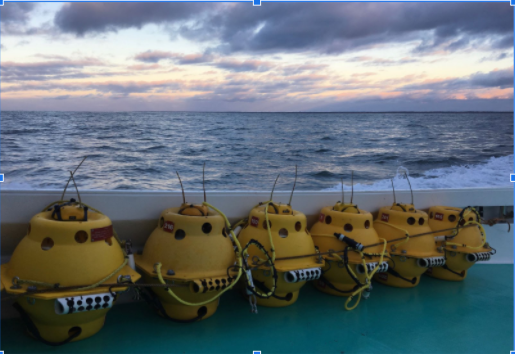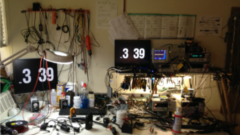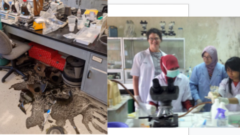Career Day: Engineering & Technology Session
The Engineering and Technology session of The Earth is My Boss: Conservation Career Day had a panel of four talented professionals who shared their experiences using technology and engineering to protect the Earth. Our very own Susan Licher, Project Assistant of the K-12 Education Team, facilitated the panel. Susan is passionate about conservation and obtained a bachelor’s degree in Geography and a master’s in Resource Planning. In her introduction, Susan spoke about the many career opportunities in conservation technology and engineering. By pursuing a career in these quickly evolving fields, you can contribute to innovative and creative conservation solutions!

Bobbi uses audio data to identify animals in lots of different environments, even if they are not visible. Audio technology enables scientists to learn about how animals communicate in ways that we cannot always hear or recognize. Photo courtesy of Bobbi Eastabrook.
Bobbi Estabrook, our first panelist, works at the Cornell Lab of Ornithology’s Center for Bioacoustics. She has always loved animals and is passionate about protecting them. Bobbi started her undergraduate career studying geology, but naturally, her passion led her to study biology. Today, her job typically involves using computers to analyze audio files taken from different sampling sites in the field. While most of her work requires a computer, she still gets to spend plenty of time outdoors and all over the world setting up technology for data collection. Bobbi’s advice for aspiring scientists is that if something interests you, go ahead and try it! She also recommends talking to professors and professionals, as connections are very important. Finally, she emphasized that no matter where you are in your career path, it is never too late to change your course!

As a teen, Jasdev loved math and fractal designs. When he discovered that he could make programs to reproduce these designs, he became fascinated with investigating all that computers can do. Photo courtesy of Jasdev Imani.
Our second panelist, Jasdev Imani, is an application developer at the Cornell Lab of Ornithology. Growing up in Africa, Jasdev spent a lot of time outdoors and had no idea he would work with computers and software. At age 11, he read a book about bird ID that opened his eyes to how much diversity existed in the natural world, and he became fascinated with birds and the outdoors. He later went on to have a career as an economist but ultimately decided he wanted to work with computers and software. Working at Cornell Lab of Ornithology, Jasdev found that he could easily combine his love for the outdoors and computer science by developing software for apps like eBird. While he spends a lot of time working indoors with computers, the community of developers at his office and travel opportunities enable him to maintain a balance between his passions for computers and the outdoors. Jasdev’s advice for individuals interested in computer science and conservation is to try lots of different things, follow your passion, and dream big.

There is no typical day of problem solving at Dr. Marchetto’s cluttered, but organized, desk. Photo courtesy of Dr. Peter Marchetto.
Dr. Peter Marchetto, our third panelist, became interested in science at a young age; at four years old, he proudly told his parents that he would become a scientist. His parents took this in stride and encouraged him to ask questions and conduct research, and Dr. Marchetto grew up understanding many aspects of all sorts of scientific fields. Once he got older, he noticed an imbalance between different scientific fields, with some getting expensive and elaborate technology, while others did not get the same attention and tools. This realization inspired Dr. Marchetto to pursue a career creating technology that would help ecologists and biologists build tools that they could not necessarily design or build themselves. Now, Dr. Marchetto creates technology for conservationists that helps them conduct research in ways that may have been difficult or impossible before. While Dr. Marchetto spends most of his day problem-solving at a desk, he also spends time outside trying out new equipment. Dr. Marchetto’s advice for curious and passionate individuals is to be flexible by learning and developing lots of different skills in different scientific fields. And finally, “Remember that nature is a system of systems, so systems thinking is always paramount. Read nature, sometimes using words.”

While setbacks happen, finding solutions to help real people & solve real world problems is what makes Dr. Richardson love her career! Photos courtesy of Dr. Ruth Richardson.
Dr. Ruth Richardson, our final panelist, is a professor at Cornell University specializing in microbiology and environmental engineering. As a child, she loved the outdoors and particularly, anywhere there was water. As a teenager, she learned about the “Seven Generations” principle, which states that our actions and decisions in the world today will impact many generations that follow us. This principle truly propelled her into a field focused on conservation and science, and today she invents new ways of using microbes for “good” purposes. Her days involve teaching, writing, and a lot of collaboration between coworkers, students, and community partners. Dr. Richardson has worked in many countries, and her work includes sustainable sewage treatment, bioenergy, and detecting microbial hazards. Dr. Richardson’s advice for aspiring scientists is to keep yourself open to exploring new and different things! Avoid expectations of what your job should be like and let your intuition guide you. She also recommends participating in extracurriculars to feed your soul.
Interested in a career in engineering & technology? Our panelists emphasized the importance of flexibility, remaining open to change in yourself and the world, and following your interests! It is never too early for career development. They recommend joining clubs, applying to internships, and always paying attention to nature. Check out the following career/job resources: The Student Conservation Association, and Texas A&M job board, and student organizations like 4-H, SWENext, Boy Scouts, Girl Scouts, and Boys and Girls Club. Remember: keep your curiosity, do not let setbacks discourage you from pursuing your dreams and passions, and it is never too early to gain experience!